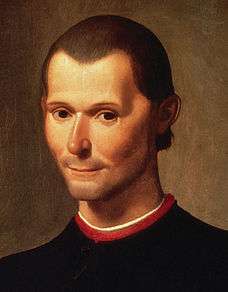Virtù

Virtù is a concept theorized by Niccolò Machiavelli, centered on the martial spirit and ability of a population or leader,[1] but also encompassing a broader collection of traits necessary for maintenance of the state and "the achievement of great things."[2]
In a secondary development, the same word came to mean an object of art.
Classical and medieval origins
Virtù, an Italian word, is derived from the Latin virtus. It describes the qualities desirable for a man, which might not be the same as virtue conventionally defined. In the Italian language, the term virtù is historically related to the Greek concept of arete, the Latin virtus, and Medieval Catholic virtues, e.g. the Seven virtues, and thus Machiavelli's use of the term is linked to the concept of virtue ethics. Machiavelli suggests a different set of virtues than Aristotle and Thomas Aquinas, apparently with less focus on beneficience and concord, and with more focus on courage.
Aristotle had early raised the question "whether we ought to regard the virtue of a good man and that of a sound citizen as the same virtue";[3] Thomas Aquinas had continued to stress that sometimes "someone is a good citizen who has not the quality...[of] a good man".[4]
According to Machiavelli, virtù includes pride, bravery, civic humanism, strength and an amount of ruthlessness.
Florentines
Florentine republicans at the turn of the 16th Century like Francesco Guicciardini rediscovered the classical concept of the virtue of the active citizen, and looked to it for an answer to the problems of preserving their city-state's independence.[5]
Machiavelli extended the study of classical virtue in the sense of skill, valor and leadership, to encompass the individual prince or war-leader as well.[6]
Virtù, for Machiavelli, was not equivalent to moral virtue, but was instead linked to the raison d'État. Indeed, what was good for the state and for the leader may be contradictory to that which is morally good in the Christian sense.
Influence
Both the positive Machiavellian idealisation of the virtues of ancient Roman republicanism, and the negative image of virtù as realpolitik passed into the wider European consciousness over the centuries that followed.[7]
Artistic value
A secondary English meaning developed in the 18th century was a curio or art-object - as being something of value in itself.[8] Thus Horace Walpole could refer to “my books, my virtus and my other follies”.[9]
Following the establishment of the Royal Academy in 1768, one contemporary considered that “the taste for virtu has become universal; persons of all ranks and degrees set up for connoisseurs”.[10]
See also
References
- ↑ Machiavelli and the politics of virtue
- ↑ John Wesley Yoest, Jr. (29 August 2017). The Memo: How the Classified Military Document That Helped the U.S. Win WWII Can Help You Succeed in Business. Post Hill Press. p. 70. ISBN 978-1-68261-396-2.
- ↑ Aristotle, The Politics (1992) p. 179
- ↑ Walter Ullmann, A History of Political Thought: The Middle Ages (1965) p. 176
- ↑ J. H. Hexter, On Historians (1979) p. 276-9
- ↑ Jack Donnelly, Realism and International Relations (2000) p. 175-7
- ↑ J. G. A. Pocock ed., The Varieties of British Political Thought, 1500-1800 (1996) p. 58 and p. 68
- ↑ Ezra Pound, Ezra Pound and the Visual Arts (1980) p. 65
- ↑ Quoted in 'Virtu', H. Osborne ed., The Oxford Companion to Art (Bath 1992) p. 1195
- ↑ Fugitive Miscellanies [1773], quoted in M. Dorothy George, Hogarth to Cruikshank (London 1967) p. 121
Further reading
- J. G. A Pocock, The Machiavellian Moment (1977)